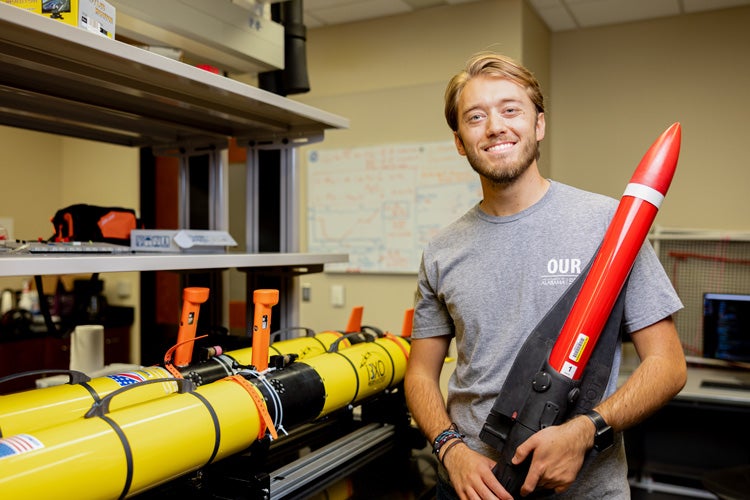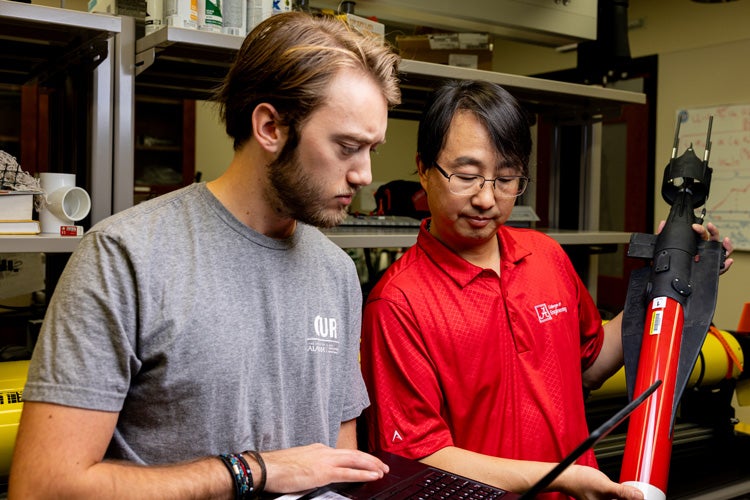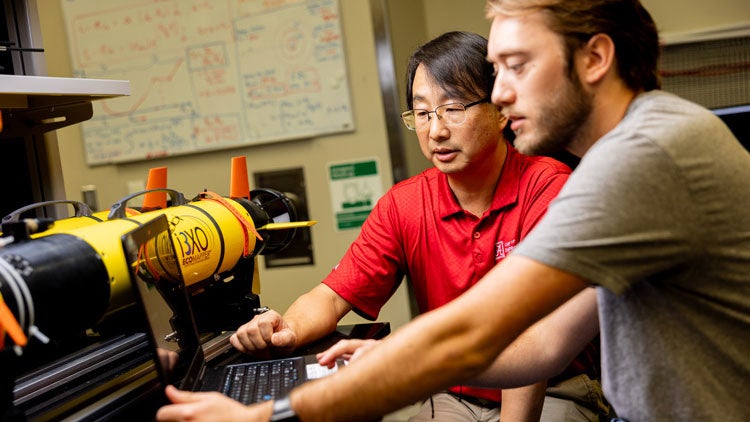Undergraduate research opportunities enrich the learning experience and, in many instances, provide insight into future career or graduate-level interests. UA provides the programs and resources to make undergraduate research available to all that are interested.
Dr. Aijun Song, associate professor of electrical and computer engineering, mentors many undergraduate and graduate students in the mu-Net Lab, which studies wireless communications, networking, and robotics for marine applications.
Carter Pate, a computer engineering major from Kansas City, Missouri, is currently working with Dr. Song’s lab on a project that explores wireless communications for autonomous underwater vehicles (AUVs). This research, which investigates sound waves in aquatic environments, could help oceanographers explore and monitor the ocean.
Dr. Song, how and why did you become a faculty research mentor?
Becoming a faculty research mentor at the University of Alabama happened organically for me. Each semester, I have the privilege of identifying exceptional undergraduate students in my class. I invited these students to participate in research projects in my lab. That was how I started to mentor undergraduate researchers.
It is a mutually beneficial arrangement. Multiple undergraduate students have not only made substantial contributions to my research projects but have also chosen to pursue graduate studies with me.


What are the benefits of involving undergraduate students in your research?
Mentoring undergraduate researchers has been a rewarding experience for me. Witnessing their growth and development has been gratifying. Three of my former undergraduate researchers have gone on to pursue doctoral degrees at institutions like Johns Hopkins University, the University of Florida, and the University of Alabama. Several have also earned accolades at the departmental, university, and even national levels.
Undergraduate students can make significant contributions to the research project while getting their learning and experience. It is also a valuable pathway to identify and attract top students for future graduate studies.
Carter, talk about your experience with research — what does UA offer that is unique, and did you consider those offerings when choosing UA for your undergraduate career?
The University of Alabama is classified as a R1 research institution. This designation describes institutions that are committed to producing groundbreaking research. At UA, the emphasis on research is evident. The Emerging Scholars Program and the RRSP (Randall Research Scholars Program) are academic programs geared directly towards promoting undergraduate research. The Office of Undergraduate Research hosts a team of student Undergraduate Research Ambassadors to advise students on conducting research. Simply looking at the campus reveals UA’s dedication to research, as the campus sports two buildings dedicated to engineering research at the heart of campus and a newly installed building for the Alabama Water Institute.
Why should undergraduates get involved with research or what advice would you give other students who want to get started in research?
The hardest thing to do in a research position as an undergraduate is get started. During your first semester of work in a lab, progress will feel slow. You may not immediately feel like your contributions are helpful, especially compared to the graduate students alongside which you will be working. At these early stages, it is crucial to remember that the skills necessary to make waves in a lab will come with time. Give yourself time to grow into a project.
See Dr. Song’s AUVs featured in the Alabama Water Institute video. Undergraduate students interested in learning more about research mentorship opportunities may contact Leanne Carroll, program manager, Office for Undergraduate Research.
Another version of this story was published on UA News.
